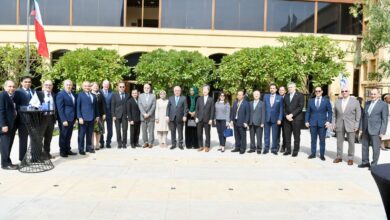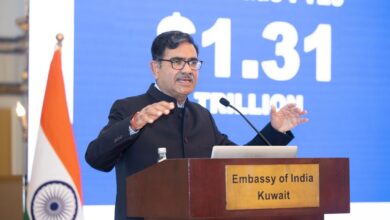CSB unveils 2025–2026 training plan to boost government efficiency

The Human Resources Development Center at the Administrative Development Sector of the Civil Service Bureau has launched its comprehensive training plan for the 2025–2026 season, targeting government employees across all job categories.
The Bureau has called on those interested in participating to complete registration through their respective agencies, following the approved procedures.
Dr. Essam Al-Rubaian, Head of the Civil Service Bureau, emphasized that the new training initiative aligns with the “New Kuwait 2035” vision and is part of broader government efforts to enhance institutional performance and modernize the public sector, reports Al-Rai daily.
The plan features 60 tailored programs focused on developing national talents, boosting the performance of government agencies, and meeting the challenges of an evolving administrative environment.
In his introductory remarks, Al-Rubaian stressed that investing in human capital is no longer a luxury, but a strategic necessity. He noted that the training plan was developed after a detailed analysis of employee performance indicators and institutional needs, with built-in tools to measure the effectiveness and real-world impact of each program.
“We believe that meaningful training must yield tangible improvements in service delivery, employee performance, and citizen satisfaction,” he said.
Al-Rubaian explained that the programs will emphasize leadership development, digital empowerment, and the enhancement of institutional systems. They will also promote corporate governance, transparency, and ethical conduct as core values, contributing to a culture of responsibility and accountability across the public sector.
The approach also links training directly to performance records to ensure fairness, relevance, and lasting outcomes, fostering what he described as the “responsible employee” model — one that values continuous learning and sustainable performance.
Echoing this vision, Mohammed Al-Ahmad, Assistant Undersecretary for the Administrative Development Sector, highlighted the central role of human capital in achieving institutional excellence and administrative sustainability. “With the expansion of state responsibilities and rising public expectations, empowering public servants is essential to improving government performance,” he said.
Al-Ahmad noted that the programs were designed to produce measurable improvements in employee competencies and work environments. Developed from performance gap analyses, the training is directly aligned with job duties and current challenges.
He added that special attention was given to corporate governance principles, professional conduct, and institutional transparency, reflecting the Bureau’s commitment to values-driven public service.
As Kuwait continues to advance its digital transformation agenda, Al-Ahmad said the plan includes training to strengthen digital capabilities and prepare government employees for smart systems and digital service platforms. This, he explained, will help accelerate workflows and improve the quality of service to the public.
He concluded by affirming that the Administrative Development Sector remains committed to supporting all government agencies with technical expertise, targeted training, and performance-linked development. The ultimate goal, he said, is to establish a more responsive, ethical, and productive public administration equipped to navigate rapid changes and achieve national development goals.












